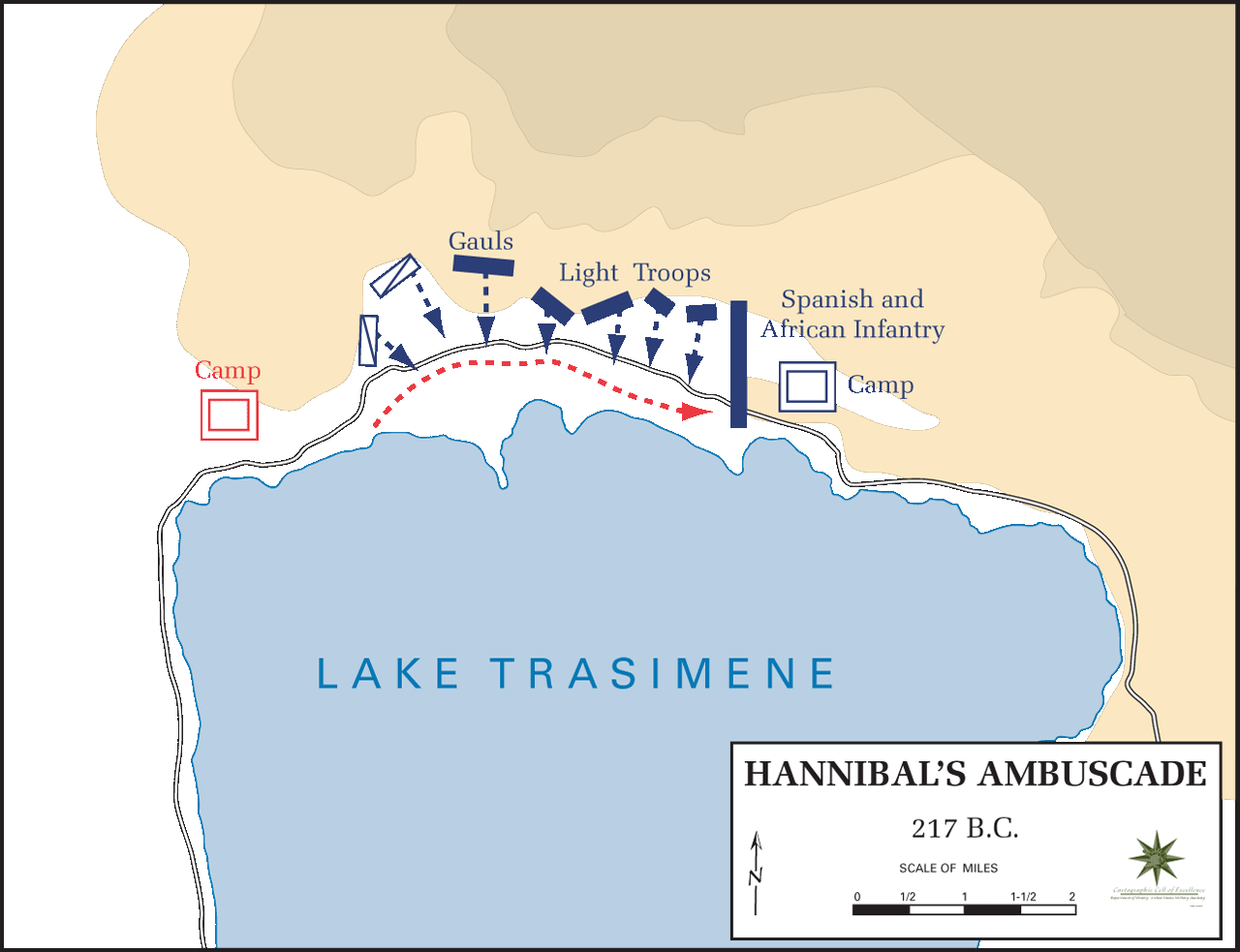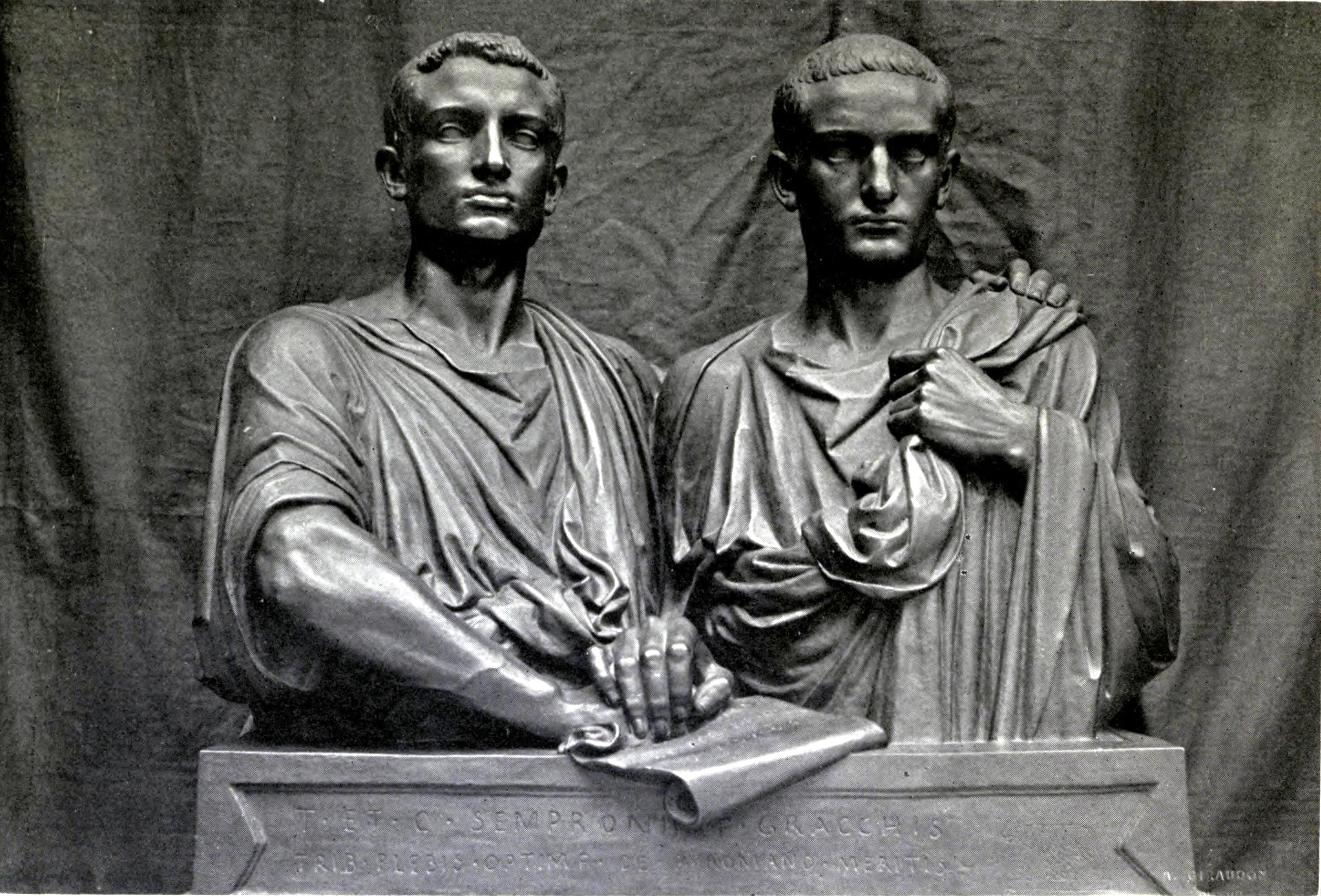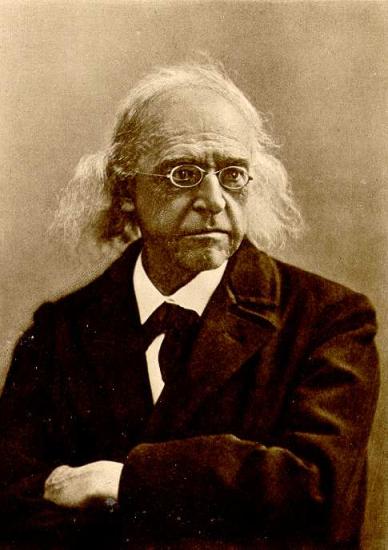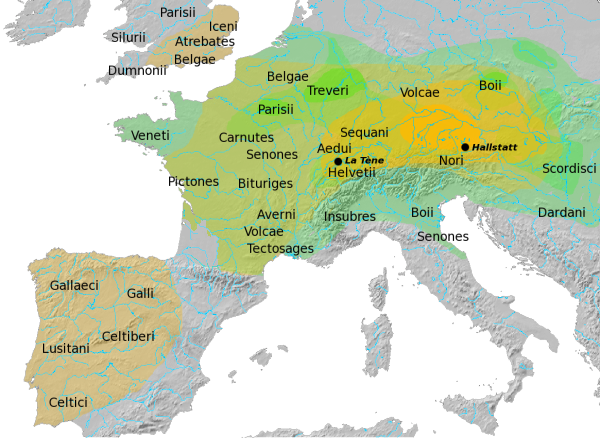|
C. Flaminius
Gaius Flaminius (c. 275 BC24 June 217 BC) was a leading Roman politician in the third century BC. Flaminius served as consul twice, in 223 and 217. He is notable for the ''Lex Flaminia'', a land reform passed in 232, the construction of the Circus Flaminius in 221, the construction of the Via Flaminia, and his death at the hands of Hannibal's army at the Battle of Lake Trasimene in 217, during the Second Punic War. Flaminius is celebrated by ancient sources as being a skilled orator and a man possessed of great piety, strength, and determination. He is, however, simultaneously criticised by ancient writers such as Cicero and Livy for his popular policies and disregard of Roman traditions, particularly during the terms of his tribunate and second consulship. Tribunate and the ''Lex Flaminia'', 232 BC Flaminius was elected as tribune of the plebs in 232 BC. Cicero writes that Flaminius was an accomplished orator before the people, a skill that likely helped him achieve the trib ... [...More Info...] [...Related Items...] OR: [Wikipedia] [Google] [Baidu] |
Ducarius
Ducarius was a Gaul, Gallic nobleman from the Insubres who fought for Hannibal at the Battle of Lake Trasimene on 21 June 217 BC, during the Second Punic War, and, according to Livy, slew the Roman Republic, Roman commander Gaius Flaminius (consul 223 BC), Gaius Flaminius. As described by Livy: {{blockquote, text=For almost three hours the fighting went on; everywhere a desperate struggle was kept up, but it raged with greater fierceness round the consul. He was followed by the pick of his army, and wherever he saw his men hard pressed and in difficulties he at once went to their help. Distinguished by his armour he was the object of the enemy's fiercest attacks, which his comrades did their utmost to repel, until an Insubres, Insubrian horseman who knew the consul by sight — his name was Ducarius — cried out to his countrymen, "Here is the man who slew our legions and laid waste our city and our lands! I will offer him in sacrifice to the shades of my foully murdered countrym ... [...More Info...] [...Related Items...] OR: [Wikipedia] [Google] [Baidu] |
Livy
Titus Livius (; 59 BC – AD 17), known in English as Livy ( ), was a Roman historian. He wrote a monumental history of Rome and the Roman people, titled , covering the period from the earliest legends of Rome before the traditional founding in 753 BC through the reign of Augustus in Livy's own lifetime. He was on good terms with members of the Julio-Claudian dynasty and was a friend of Augustus. Livy encouraged Augustus’s young grandnephew, the future emperor Claudius, to take up the writing of history. Life Livy was born in Patavium in northern Italy, now modern Padua, probably in 59 BC. At the time of his birth, his home city of Patavium was the second wealthiest on the Italian peninsula, and the largest in the province of Cisalpine Gaul (northern Italy). Cisalpine Gaul was merged into Italy proper during his lifetime and its inhabitants were given Roman citizenship by Julius Caesar. In his works, Livy often expressed his deep affection and pride for Patavium, and the ... [...More Info...] [...Related Items...] OR: [Wikipedia] [Google] [Baidu] |
Maiestas Law
The law of majestas, or ''lex maiestatis'', encompasses several ancient Roman laws (''leges maiestatis'') throughout the Republican and Imperial periods dealing with crimes against the Roman people, state, or Emperor. Description In Roman law, the offences originally falling under the head of treason were almost exclusively those committed in military service. The very name ''perduellio'', the name of the crime in the older Roman law, is evidence of this. ''Perduelles'' were, strictly, public enemies who bore arms against the state; and traitors were regarded as having no more rights than public enemies. The Twelve Tables made it punishable with death to communicate with the enemy or to betray a citizen to the enemy. Other kinds of ''perduellio'' were punished by "interdiction of fire and water" (''aquae et ignis interdictio''), in other words, banishment. The crime was tried before a special tribunal (''quaestio'') by two officials (''duumviri perduellionis''), which was perhaps t ... [...More Info...] [...Related Items...] OR: [Wikipedia] [Google] [Baidu] |
Gracchi
The Gracchi brothers were two brothers who lived during the beginning of the late Roman Republic: Tiberius Gracchus and Gaius Gracchus. They served in the Tribune of the plebs, plebeian tribunates of 133 BC and 122–121 BC, respectively. They have been received as well-born and eloquent advocates for social reform who were both killed by a reactionary political system; their terms in the tribunate precipitated a series of domestic crises which are viewed as unsettling the Roman Republic and contributing to its collapse. Tiberius Gracchus passed Lex agraria, legislation which established a commission to survey Ager publicus, Roman public land, reassert state claims to it, and redistribute it to poor rural farmers. These reforms were a reaction to a perceived decline in Italy's rural population. A decade later, Gaius Gracchus' reforms, among other things, attempted to buttress Tiberius' land commission and start Roman colonisation outside of Italy. They also were far ... [...More Info...] [...Related Items...] OR: [Wikipedia] [Google] [Baidu] |
Populares
''Optimates'' (, ; Latin for "best ones"; ) and ''populares'' (; Latin for "supporters of the people"; ) are labels applied to politicians, political groups, traditions, strategies, or ideologies in the late Roman Republic. There is "heated academic discussion" as to whether Romans would have recognised an ideological content or political split in the label. Among other things, ''optimates'' have been seen as supporters of the continued authority of the senate, politicians who operated mostly in the senate, or opponents of the ''populares''. The ''populares'' have also been seen as focusing on operating before the popular assemblies, generally in opposition to the senate, using "the populace, rather than the senate, as a means or advantage. References to ''optimates'' (also called ''boni'', "good men") and ''populares'' are found among the writings of Roman authors of the 1st century BC. The distinction between the terms is most clearly established in Cicero's '' Pro S ... [...More Info...] [...Related Items...] OR: [Wikipedia] [Google] [Baidu] |
Valerius Maximus
Valerius Maximus () was a 1st-century Latin writer and author of a collection of historical anecdotes: ' ("Nine books of memorable deeds and sayings", also known as ''De factis dictisque memorabilibus'' or ''Facta et dicta memorabilia''). He worked during the reign of Tiberius (14 AD to 37 AD). During the Middle Ages, Valerius Maximus was one of the most copied Latin prose authors, second only to Priscian. More than 600 medieval manuscripts of his books have survived as a result.Briscoe, ''Valerius Maximus'', p. 15. Biography Nothing is known of his life except that his family was poor and undistinguished, and that he owed everything to Sextus Pompeius (consul AD 14),H J Rose, ''A Handbook of Latin Literature'' (London 1966) p. 356 proconsul of Asia, whom he accompanied to the East in 27. Pompeius was the center of a literary circle to which Ovid belonged; he was also an intimate friend of the most literary prince of the imperial family, Germanicus. Although he shared the same n ... [...More Info...] [...Related Items...] OR: [Wikipedia] [Google] [Baidu] |
Quintus Fabius Maximus Verrucosus
Quintus Fabius Maximus Verrucosus (), surnamed Cunctator ( 280 – 203 BC), was a Roman statesman and general of the third century BC. He was Roman consul, consul five times (233, 228, 215, 214, and 209 BC) and was appointed Roman dictator, dictator in 221 and 217 BC. He was Roman censor, censor in 230 BC. His agnomen, ''Cunctator'', usually translated as "the delayer", refers to Fabian strategy, the strategy that he employed against Hannibal's forces during the Second Punic War. Facing an outstanding commander with superior numbers, he pursued a then-novel strategy of targeting the enemy's supply lines, and accepting only smaller engagements on favourable ground, rather than risking his entire army on direct confrontation with Hannibal himself. As a result, he is regarded as the originator of many tactics used in guerrilla warfare. Beginnings Born at Rome c. 280 BC, Fabius was a descendant of the ancient Patrician (ancient Rome), patrician Fabia gens. He was the son or grands ... [...More Info...] [...Related Items...] OR: [Wikipedia] [Google] [Baidu] |
Illyria
In classical and late antiquity, Illyria (; , ''Illyría'' or , ''Illyrís''; , ''Illyricum'') was a region in the western part of the Balkan Peninsula inhabited by numerous tribes of people collectively known as the Illyrians. The Ancient Greeks initially used the term Illyris to define approximately the area of northern and central Albania down to the Aoös valley (modern Vjosa) and the Bay of Vlorë, including in most periods much of the lakeland area ( Ohrid and Prespa). It corresponded to the region that neighboured Macedonia and Epirus. In Roman times the terms Illyria, Illyris, or Illyricum were extended from the territory that was roughly located in the area of the south-eastern Adriatic coast (modern Albania and Montenegro) and its hinterland, to a broader region stretching between the whole eastern Adriatic and the Danube. From about mid-1st century BC the term '' Illyricum'' was used by the Romans for the province of the Empire that stretched along the eastern A ... [...More Info...] [...Related Items...] OR: [Wikipedia] [Google] [Baidu] |
Ager Publicus
The ''ager publicus'' (; ) is the Latin name for the state land of ancient Rome. It was usually acquired via the means of expropriation from enemies of Rome. History In the earliest periods of Roman expansion in central Italy, the ''ager publicus'' was used for Roman and (after 338 BC) Latin colonies. Later tradition held that as far back as the 5th century BC, the patrician and plebeian classes disputed the rights of the rich to exploit the land, and in 367 BC two Plebeian Tribunes, Gaius Licinius Solo and Lucius Sextius Sextinus Lateranus promulgated a law which limited the amount of the ''ager publicus'' to be held by any individual to 500 iugera, roughly . In the half century following the Battle of Telamon ( BC), the Romans fully absorbed Cisalpine Gaul, adding huge swathes of land to the ''ager publicus'', land which was more often than not given to new Latin colonies or to small freeholders. In the south of Italy, huge tracts of newly re-incorporated lands remain ... [...More Info...] [...Related Items...] OR: [Wikipedia] [Google] [Baidu] |
Boii
The Boii (Latin language, Latin plural, singular ''Boius''; ) were a Celts, Celtic tribe of the later Iron Age, attested at various times in Cisalpine Gaul (present-day Northern Italy), Pannonia (present-day Austria and Hungary), present-day Bavaria, in and around present-day Bohemia (after whom the region is named in most languages; comprising the bulk of today's Czech Republic), parts of present-day Slovakia and Poland, and Gallia Narbonensis (located in modern Languedoc and Provence). In addition, the archaeological evidence indicates that in the 2nd century BC Celts expanded from Bohemia through the Kłodzko Valley into Silesia, now part of Poland and the Czech Republic. They first appear in history in connection with the Campaign history of the Roman military#Celtic invasion of Italia (390–387 BC), Gallic invasion of northern Italy, 390 BC, when they made the Etruscan civilization, Etruscan city of Felsina their new capital, Bologna, Bononia (Bologna). After a series of ... [...More Info...] [...Related Items...] OR: [Wikipedia] [Google] [Baidu] |
Polybius
Polybius (; , ; ) was a Greek historian of the middle Hellenistic period. He is noted for his work , a universal history documenting the rise of Rome in the Mediterranean in the third and second centuries BC. It covered the period of 264–146 BC, recording in detail events in Italy, Iberia, Greece, Macedonia, Syria, Egypt and Africa, and documented the Punic Wars and Macedonian Wars among many others. Polybius' ''Histories'' is important not only for being the only Hellenistic historical work to survive in any substantial form, but also for its analysis of constitutional change and the mixed constitution. Polybius' discussion of the separation of powers in government, of checks and balances to limit power, and his introduction of "the people", all influenced Montesquieu's '' The Spirit of the Laws'', John Locke's '' Two Treatises of Government'', and the framers of the United States Constitution. The leading expert on Polybius for nearly a century was F. W. Walbank (1909 ... [...More Info...] [...Related Items...] OR: [Wikipedia] [Google] [Baidu] |
Senones
The Senones or Senonii (Gaulish: "the ancient ones") were an ancient Gallic tribe dwelling in the Seine basin, around present-day Sens, during the Iron Age and the Roman period. Part of the Senones settled in the Italian peninsula, where they ousted the Umbrians between Ariminum (modern-day Rimini) and Ancona. According to later Roman accounts, they were the leaders of the Gallic war-band that captured Rome during the Battle of the Allia in 390 BC. They remained a constant threat until Rome eventually subjugated them in 283 BC, after which they disappeared from history. Name They are mentioned as ''Sḗnōnes'' (Σήνωνες) and ''Sḗnōnas'' (Σήνωνας) by Polybius (2nd c. BC), ''Senonii'' by Caesar (mid-1st c. BC), ''Sénnōnes'' (Σέννωνες) by Diodorus Siculus (1st c. BC), ''Sénōnes'' (Σένωνες) by Strabo (early 1st c. AD), ''Senones'' by Pliny (1st c. AD), ''Sénones'' (Σένονες) by Ptolemy (2nd c. AD), and as ''Senones'' by Ammia ... [...More Info...] [...Related Items...] OR: [Wikipedia] [Google] [Baidu] |







